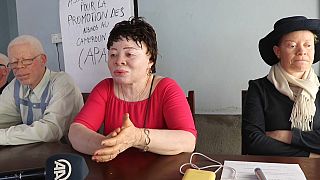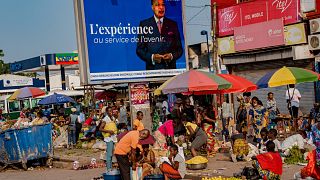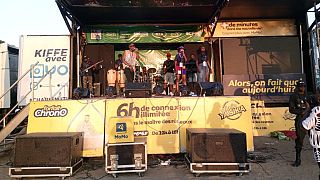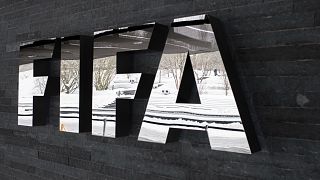Republic of the Congo
Often discriminated against, attacked and even sacrificed in obscure witchcraft rituals in some African countries, albinos also face the threat of virulent skin cancers.
But a clinic in the Republic of the Congo is fighting to improve treatment, change perceptions and save lives, having provided free healthcare to 460 albinos of all ages so far.
"An albino is a human being like any other," says 19-year-old Reine Balounga, who waits in the capital Brazzaville to be treated for blotches that have affected her skin since childhood.
Albinism, a rare genetic disease that is hereditary and non-contagious, causes an insufficient production of melanin and the partial or complete absence of pigment in the skin, hair and eyes.
It is still widely misunderstood, socially and medically.
Although it exists throughout the world, albinism is more widespread in sub-Saharan Africa, with World Health Organization estimates varying between one case per 5,000 people and one per 15,000.
- 'Different image' -
The clinic opened in 2013 and belongs to the Johny Chancel Association for Albinos, which has been running an unprecedented campaign to test for and treat skin cancer since January.
Johny Chancel Ngamouana, an albino philanthropist who heads the association, said skin cancer is the leading cause of death among the minority.
According to the United Nations, in some countries, a majority of albinos die from skin cancer between the ages of 30 and 40.
African sufferers of the condition are often unable to afford sunglasses or effective sun cream.
Four Russian doctors and another from neighbouring Democratic Republic of Congo are now involved in the campaign through partnerships to train the clinic's local doctors and provide extra care.
"From time to time, we need (people with) different experiences to improve the condition of people suffering with albinism in Congo," explained Ngamouana, 39.
According to the UN, "the physical appearance of persons with albinism is often the object of erroneous beliefs and myths influenced by superstition, which foster their marginalisation and social exclusion."
Although occasionally stigmatised, Congolese albinos are not victims of ritual crimes found in other African countries including neighbouring Gabon, or Tanzania.
Albino children in the central African nation attend the same schools, public and private, as their peers.
"I'm loved in my family, but in my area there are other people who don't like me at all," Balounga told AFP, adding that some people still seek to provoke albinos on the street.
Gemard Mougani, 31, suffers from wounds on his face and neck but is pinning his hopes on the new campaign.
"I'm waiting to get the cure for my wounds. I'm waiting for a different image of albinos because most of them have marks and are disfigured," he said.











00:50
Ons Jabeur retires from Wimbledon Opener due to breathing issues
11:15
AI drones lead breakthrough against malaria in Africa [Business Africa]
01:29
Experts warn of danger of exercising in extreme heat and humidity
01:02
As cholera cases surge, African leaders urge local production of vaccine
01:00
New cholera outbreak in Sudan kills 172 people in a week
01:18
Former U.S. president diagnosed with cancer